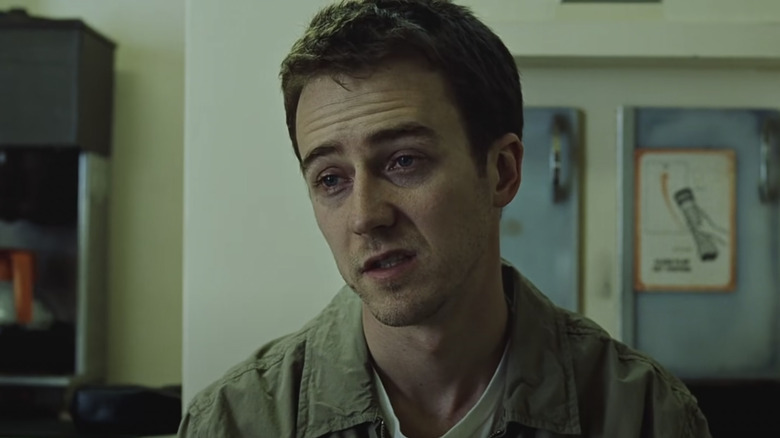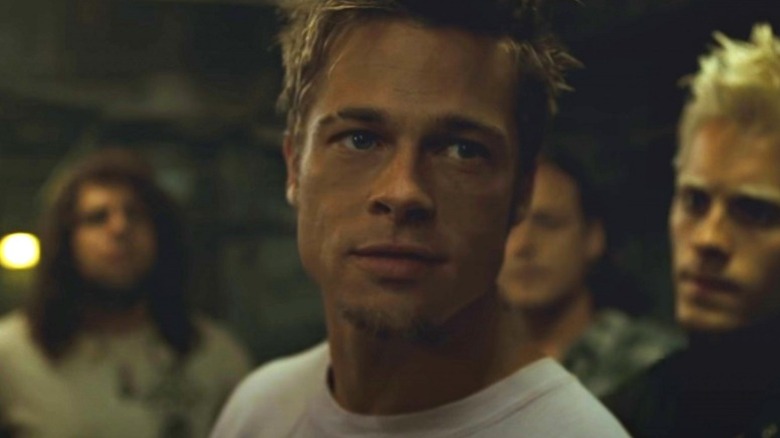David Fincher Directed Fight Club Because David O. Russell 'Didn't Get It'
"Fight Club" is a movie people either love or hate. Some viewers are drawn to the nihilistic rants and machismo of Tyler Durden (Brad Pitt), while others are turned off by his constant violence and ramblings about the emptiness of consumerism and society. Chuck Palahniuk, who wrote the novel the film is based on, prides himself on eliciting strong, yet polarizing, reactions through his words. In an interview with The Guardian, he admitted, "I'm fascinated by low fiction that generates a physical response: disgusts the reader, makes them hungry or sexually aroused."
The story of an Ikea-obsessed corporate drone running an underground fighting ring that partakes in breaking and entering and terrorism on the side is a decent premise that might catch an audience's attention, but Palahniuk kicks it up a notch with brutal violence, unabashed sexuality, and unapologetic nihilism. Nothing ruffles feathers quite like the blend of blood, sex, and philosophy, which seems to be exactly what Palahniuk was hoping to do.
When the book was optioned as a film, Hollywood directors also had strong reactions to the story, but they weren't the ones the author intended. According to Brian Raftery in his book "Best. Movie. Year. Ever: How 1999 Blew Up the Big Screen" (via The Ringer), instead of disgust, hunger, or sexual arousal, filmmaker David O. Russell was confused and admitted he just "didn't get it." However, David Fincher connected with the story, and saw it as a "rallying cry" for a disaffected generation.
Fincher vs Russell
The directors' differences of opinion might come down to the type of films and characters they're drawn to. Russell's filmmaking resumé is full of second coming-of-age stories, where people in their late twenties to thirties experience a cataclysmic event or sudden change that forces them into a new phase of life. To enjoy these films, it's critical for the audience to connect with the characters, and feel the crush of their failures and pride in their accomplishments along with them. There is certainly a place for these movies in cinema, but this isn't the kind of directing style that would have benefited "Fight Club."
While some viewers might enjoy the film overall, it's unlikely that audiences will relate to the main characters. Tyler is entertaining, but also macho and egotistical, and the Narrator (Edward Norton) might actually be worse, since he's whiny, weak, rude, and oblivious. In light of this, it's safe to say that relying on the audience's ability to fall in love with the characters is a one-way trip to failure, which is why it's a good thing Russell passed on the film and left it to Fincher.
Rather than creating an emotional connection between his characters and the audience, Fincher focuses on making his characters' beliefs relatable. Durden isn't a likable character, but that doesn't mean all of his opinions on overconsumption and corporatism are wrong. Likewise, the Narrator comes off as entitled, but it's easy to understand his belief that it's best to blend in with the crowd and live a comfortable life on expensive furniture. Fincher's style of connecting audiences with character's beliefs and opinions is why he was the best choice for "Fight Club."
Plus, he already had experience with shocking endings.
Relating to Tyler's Beliefs
To properly communicate a character's beliefs, the director has to understand them, which is another reason Fincher was the right man for the job. As he explained in the book:
"I was in my late thirties, and I saw that book as a rallying cry. Chuck was talking about a very specific kind of anger that was engendered by a kind of malaise: 'We've been inert so long, we need to sprint into our next evolution of ourselves.' And it was easy to get swept away in just the sheer juiciness of it."
The director related to Durden's resentment and boredom, but Pitt, who gained worldwide fame before appearing in the film, was attracted to the character's thoughts on wealth and consumerism:
"I'm the guy who's got everything, [but] once you get everything, then you're just left with yourself. I've said it before and I'll say it again: It doesn't help you sleep any better, and you don't wake up any better because of it."
Meanwhile, Norton said Durden's beliefs reflected the feelings of entire generations:
"It took aim right at what a lot of us were starting to feel. The book was so sardonic and hilarious in observing the vicissitudes of Gen-X/Gen-Y's nervous anticipation of what the world was becoming— and what we were expected to buy into."
As much as viewers may react to the unsympathetic characters or the violence, sex, and machismo throughout the film, Durden's belief that modern society lacks purpose and is lost in consumerism is the most compelling aspect of the film, which is why Fincher's directing style fit the story perfectly.


